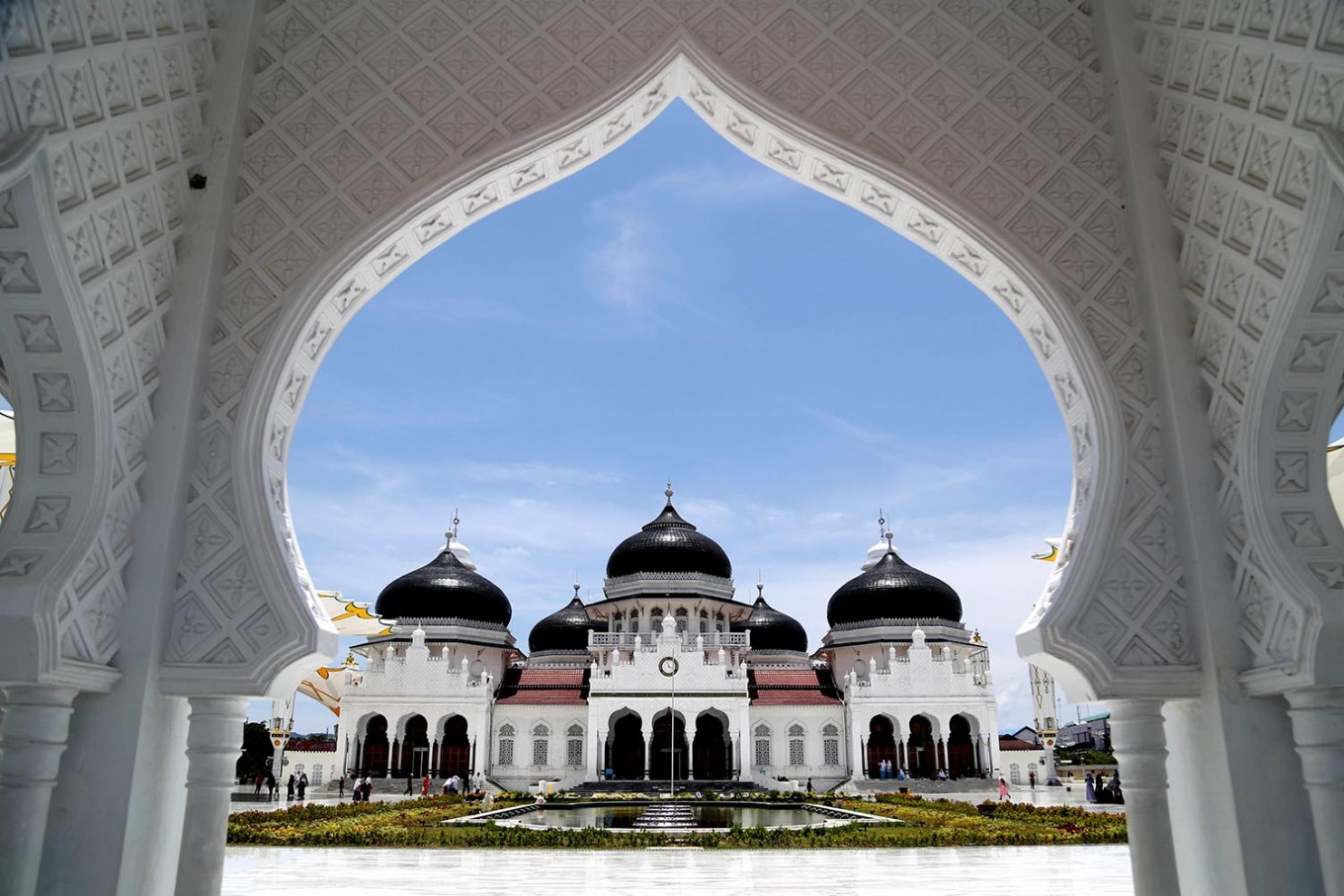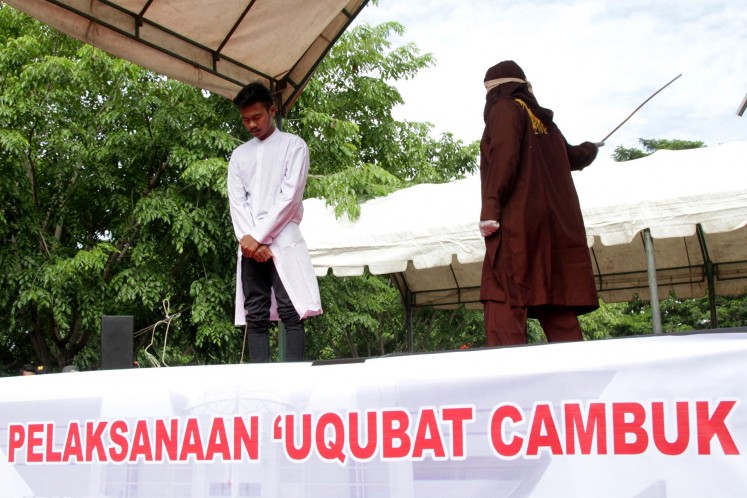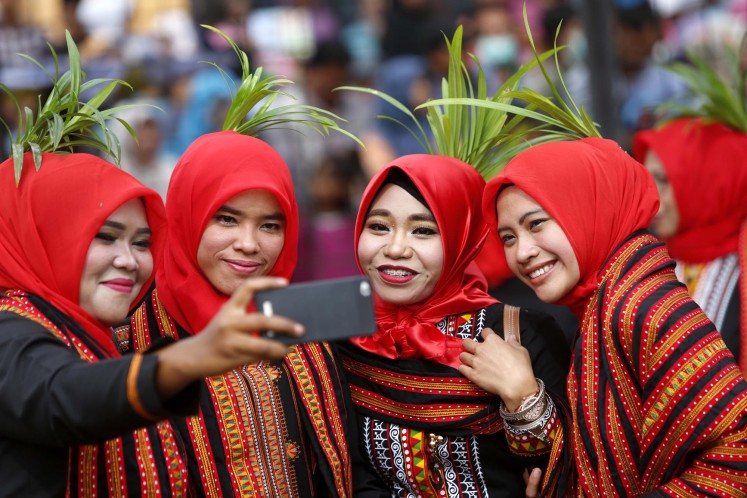Popular Reads
Top Results
Can't find what you're looking for?
View all search resultsPopular Reads
Top Results
Can't find what you're looking for?
View all search resultsQ&A: What you need to know about sharia in Aceh
The history of sharia in modern Aceh, however, goes back to the early days of the Reform Era, when Jakarta decided to grant the province a special status.
Change text size
Gift Premium Articles
to Anyone
T
he latest news coming from Aceh is hardly comforting for foreign tourists and investors looking to spend their time and money in the province: A Christian couple were publicly flogged after being found guilty of using a children’s game for gambling, which is a crime under sharia.
Local officials claimed the Christians had the option of being prosecuted under the nation’s Criminal Code, but they willingly chose sharia. So they took eight and seven lashes in exchange for six and seven months’ imprisonment, respectively.
Human rights activists doubt such a claim, saying non-Muslim offenders are mostly deprived of legal assistance and thus pressured to be tried under sharia.
The news about the flogging of the couple, identified as David Silitonga, 61, and Tjia Nyu Hwa, 45, is by no means the first of its kind. At least five non-Muslims in Aceh have been caned for breaching Aceh’s jinayat (Islamic criminal law), which was fully implemented about three years ago.
Sharia in Aceh has been controversial ever since it was first introduced shortly after the downfall of Soeharto in 1998, when Jakarta was struggling to cope with an armed insurgency there. But what type of sharia is implemented in Aceh? And how does a sharia-based legal system work there?
Below are a few things you need to know about the legal system.
Terpidana pelanggar hukum Syariat Islam menjalani uqubat (hukuman) cambuk di Banda Aceh, Aceh, Senin (11/9). Mahkamah syariah Kota Banda Aceh menvonis 10 hingga 28 kali cambuk dengan menggunakan rotan setelah dipotong masa tahanan karena melanggar Qanun (peraturan daerah) Nomor 6/2014 tentang hukum jinayat. (Antara/Irwansyah Putra)When did Aceh implement sharia, and why?
Aceh was once a major Islamic sultanate in Southeast Asia. Islamic values, therefore, are incorporated in Aceh’s hukum adat (customary law). The history of sharia in modern Aceh, however, goes back to the early days of the Reform Era, when Jakarta decided to grant the province a special status.
The conventional wisdom is that sharia in Aceh was a concession given by Jakarta under former president Abdurrahman “Gus Dur” Wahid” to Acehnese leaders to weaken the armed insurgency led by the Free Aceh Movement (GAM).
It is no surprise that GAM leaders initially rejected the formalization of sharia on the grounds that Islam has long been an integral part of Aceh’s culture, and that their struggle was driven more by political grievances than religious zeal. Only after a peace agreement was signed by Jakarta and GAM leaders in Helsinki, Finland, in 2005 did GAM accept the implementation of sharia law.
For GAM, sharia in Aceh was a gift from Jakarta, served on a silver platter for the Acehnese people. “The gift [of sharia] was placed at our parliament’s door,” Malik Mahmud, a former GAM prime minister, told BBC Indonesia.
Under the 1999 law on Aceh’s status as a special region, coupled with the 2001 law on special autonomy for Aceh and Papua, Aceh was the only region in the country given the authority to formally implement sharia law.
However, only in 2003 did Aceh formally introduce sharia as the law of the land through the enactment of three bylaws banning the consumption of alcohol, gambling and khalwat (dating in secluded places).
A year earlier, Aceh established Dinas Syariat Islam (Sharia Agency). The agency is tasked with coordinating three core sharia institutions: Mahkamah Syariah (Sharia Courts), Majelis Permusyawaratan Ulama (Ulema Consultation Council) and the Wilayatul Hisba (Sharia Police).
In 2009, Aceh’s councillors enacted their first fully pledged qanun jinayat, which included new jarimah (crimes) such as adultery and homosexuality. The bylaw stipulated that adulterers could be sentenced to death by stoning. In 2014, the councillors revised the 2009 jinayat, scrapping the provision on stoning.
The 2014 jinayat took effect in October 2015.
Helsinki Cathedral, also known as the St. Nicholas Cathedral, is a distinctive landmark of the Finland's capital. The historic Helsinki Memorandum of Understanding (MoU) between the government of Indonesia and the Free Aceh Movement (GAM) was signed on Aug. 15, 2005 in Helsinki. (Shutterstock/File)What is ‘khalwat’? And how harsh is Aceh’s sharia law?
It is a crime for a man and a woman who are not married to be in a secluded place together in Aceh. This is called khalwat and it is punishable by up to nine lashes, a fine of 150 grams of gold or 15 months’ imprisonment.
Alongside khalwat, maysir (gambling) and khamar (consuming alcohol) are also illegal under sharia.
Under the 2014 jinayat, zina (adultery and pre-marital sex), liwath (gay sex), musahaqah (lesbianism) and qadzaf (falsely accusing other people of adultery) are also classified as crimes. Those found guilty of such crimes could face up to 100 lashes or 1,000 grams of gold or 100 months in prison.
In countries where sharia is the law of the land such as Saudi Arabia and Brunei Darussalam, adultery and homosexuality are punishable by death.
According to historian Michel Feener, who has conducted extensive research on Aceh, the implementation of sharia was never driven by a “nostalgic utopian yearning for a return to seventh-century Arabia”.
In his 2013 paper, “Social Engineering Through Sharia: Islamic Law and State-Directed Da’wa in Contemporary Aceh”, Feener argues that sharia in Aceh is more of a “social engineering” attempt to rebuild Aceh following the Indonesian Military-GAM conflict and the 2004 tsunami that hit the region.
To support his argument, he cited the fact that only a few jinayat cases were handled by sharia courts each year. The Sharia Agency, he said, dakwah (campaigned) more than it focused on law enforcement. His study, however, did not examine the implementation of sharia after the enactment of the 2014 jinayat.
Does Aceh’s sharia apply to non-Muslims?
It does, but only for crimes that are not regulated under the Criminal Code such as khalwat, premarital sex or homosexuality. Non-Muslim offenders, however, could be prosecuted under sharia if they are willing to do so (the legal term for this is menundukan diri, which loosely translates to “submitting”).
Female dancers – who perform the Bines dance, a traditional dance from Gayo, Aceh –take a selfie during the event. JP/Hotli Simanjuntak (JP/Hotli Simanjuntak)Is Aceh’s sharia legal? And can it be repealed?
Aceh’s lawmakers believe it is legal, as the 2001 law on Aceh’s autonomy and the 2006 law on Aceh’s administration, they claim, clearly gives the province the authority to devise its own legislation.
But human rights activists disagree, saying the bylaws enacted by Aceh’s council should not contradict the 1945 Constitution and national laws. They argue that the caning punishment goes against the 1999 law on human rights and the UN convention on torture, which Indonesia has ratified.
The adultery provision in jinayat, they say, overlaps with the morality provisions in the Criminal Code, which are also considered discriminatory. In many cases, the morality articles in jinayat tend to victimize women.
Activists grouped under the Civil Society Network for the Advocacy of Qanun Jinayat called on the government to review the Islamic bylaw and repeal it for going against the higher laws. But the Home Ministry said in 2015 that under the 2006 law on Aceh’s administration, it did not have the authority to do so and asked the activists to bring their fight to the Supreme Court.
The Institute for Criminal Justice Reform and the Solidarity for Women activist group have taken up the challenge by filing a judicial review request against jinayat at the Surpreme Court. The court, however, has suspended its examination as the House of Representatives is still deliberating revisions of the Criminal Code.
The House has said that it will pass the Criminal Code bill into law soon. The bill reportedly includes provisions criminalizing pre-marital sex and homosexuality. It is unclear how the new Criminal Code, which has become more like jinayat, will affect the implementation of jinayat. (srs/ahw)













